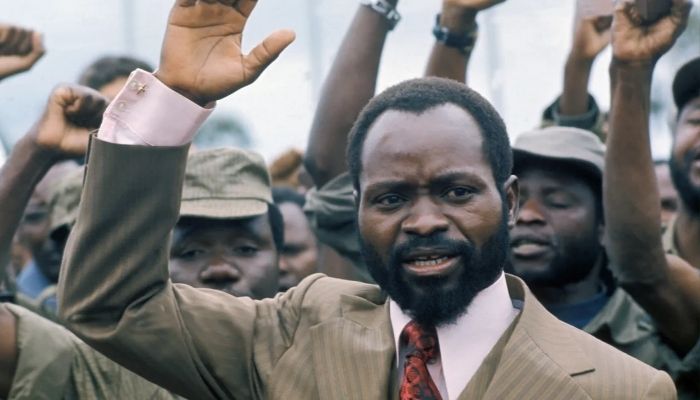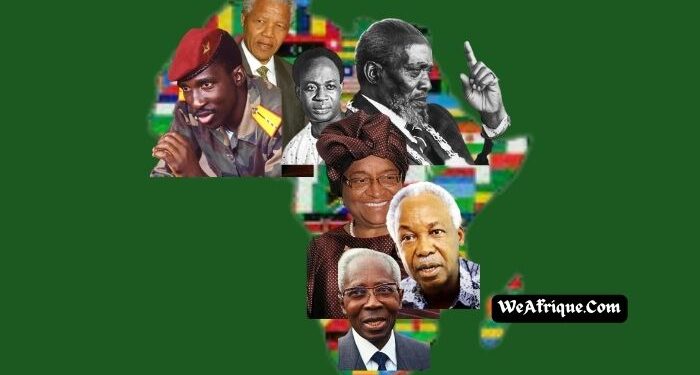In the history of Africa, many presidents came to power in the 54 countries from independence till now. Of this number, few have managed to keep lasting legacies that set their countries on the path of development or affected the lives of the citizens positively.
Among these great leaders are the likes of Nelson Mandela and Thomas Sankara whose legacy will continue to be a living part of History for many years to come.
Greatest African Presidents of All Time
1. Nelson Mandela
He was born Rolihlahla, a name that means troublemaker, and he lived to trouble the apartheid regime in South Africa for a greater part of his life. Nelson Mandela became the first black president of South Africa after many decades of fighting against apartheid, a system that segregated black South Africans who were the majority while giving power to white minorities.
Mandela fought against this unjust system which led to his imprisonment for 27 years. After his release in 1990, he and the then president F.W. de Klerk started the negotiations to end apartheid and a peaceful transition to a multiracial democracy. The Iconic leader won the Nobel peace prize in 1993 placing him on the level of other great world leaders.
His achievement would have remained less known if the relentless nation-builder had not changed the history of the country when he won the election through the ANC and came into office on May 10, 1994.
Through the sacrifice of his freedom for close to three decades, Mandela who is fondly called by his clan name, Madiba became an icon of hope and unity. His book A Long Walk to Freedom is void of any malice against his oppressors. As part of his lasting legacy, his birthday, July 18 is celebrated as Mandela day across the world.
2. Kwame Nkrumah
He is known as the father of African independence. The former Ghanaian leader led the independence struggle in his country and also supported the struggle in other African countries. He adopted African socialism to set Ghana on the path of self-governance.
Nkrumah came to power in 1952 as prime minister and became president in 1960. The president of the newly independent country was instrumental in founding the Organisation of African Union, the predecessor of the present African Union. Like other great leaders on the continent, Nkrumah wanted African countries to be united as well as gain independence from the former colonial powers. He wrote 14 books on ideology to guide the new African nation of Ghana.
His influence was felt beyond the boundaries of his native Ghana. In fact, he is regarded as the father of African nationalism due to his role. He held the position of the chairperson of the then-OAU.
Despite his visions for Ghana and Africa, Nkrumah’s life was constantly in danger leading to five assassination attempts on his life.
3. Jomo Kenyatta
Telling the History of the modern nation of Kenya would not be complete without mentioning one of the country’s most iconic leaders, Jomo Kenyatta. He was at the forefront of fighting for the independence of the former British East which later became Kenya.
He was imprisoned for nine years before he secured the freedom to become the prime minister. In 1964, he became president after which he ruled for 14 years. Throughout his stay in office, he was a strong supporter of unity among different races and economic growth in Kenya.
4. Kenneth Kaounda
Also known as the father of the nation, Kenneth Kaunda led the struggle for the independence of northern Rhodesia now known as Zambia. When the country gained independence, he invested in the educational sector. Through his leadership and appeal to Zambians, many contributed to the building of the University of Zambia.
He remained in power till 1991 when he lost the election to Frederick Chiluba. Kaunda remained an active politician till 1998 when he retired. His death in 2001 received the attention of many even outside Zambia. No wonder many nations aside from Zambia declared many days of national mourning.
5. Julius Nyerere
Like many great post-independence presidents on the continent, Nyerere was at the forefront of the struggle for independence in his homeland, Tanzania. He pressured Britain to grant independence to the Island of Zanzibar and Tanganyika, a move that led to the birth of the present East African country of Tanzania.
After the British granted independence to Tanzania in 1961, he served as the country’s first president till 1985. He introduced the Ujamaa system which promotes community value.
6. Patrice Lumumba
He fought for the liberation of African countries from colonial rule and promoted pan-Africanism. Like Mandela, Lumumba made many sacrifices for his country but he did not live long to see the Congo that he envisioned.
He was not a president but a prime minister and due to his iconic role, his name continues to make it to the list of other great African leaders of all time. He assumed office as the first PM of the newly independent country at the height of the Congo crisis that threatened its existence.
Due to his radical stance against foreign control and the tensions within the country, Lumumba was later captured and executed. Years after his death, reports surfaced to show that he was shot, buried in a shallow grave, dug out, and set ablaze.
In 2022, a golden tooth which is the only remains of Lumumba was returned to DRC from Belgium more than 6 decades later.
7. Samora Machel

He was the first president of Mozambique and served from 1975 to 1986. Samora Machel led Mozambique to independence from Portugal, this and many other leadership attributes made him the father of the nation.
Throughout his stay in office, the country was in a civil war that undermined his leadership. Nonetheless, he pushed for its development. He was also instrumental in the freedom struggle in countries like South Africa, Zambia, and Zimbabwe. It is not surprising that after he died in a plane crash in 1986, he is still honored in street names, hospitals, schools, and bridges across different countries in the world.
See Also: African Countries And Their Capitals, Independence, And Currency
8. Alpha Oumar Konare
The former Malian president served two consecutive five-year terms in office between 1992 and 2002. During his tenure, he joined the ranks of other iconic leaders through his contributions to Mali and Africa. The Historian-turned-politician invested in tourism and sports.
He worked for integration and peace in Mali and the region and even occupied the office of AU chairperson. As it is, he pursued his vision for peace when he handed over power without any issues at the end of his second term. With Mali being prone to political tensions, this made him one of the only Malian presidents to leave peacefully.
9. Leopold Sedar Senghor
He is the first president of Senegal. Senghor was a strong supporter of black consciousness, which led to his promotion of the ideology known as negritude. His poetry conveys this strong sense of being black and celebrating its pride.
Senghor promoted African socialism that was in line with the reality of Africans, especially Senegalese people. He spoke out against the unfavorable treatment of Africans.
10. Olusegun Obasanjo
He came to power as an elected president in 1999. At the time he assumed office, the country was just returning to democratic rule after many years of military rule and the fearsome dictatorship of General Sani Abacha.
Prior, he once served as a military head of state but after winning the elections, Obasanjo was invested in a new country under civilian rule. Thus, he set in motion the country on the path of growth in the 21st century.
Aside from pushing for a smooth transition to civilian rule, he also had the vision to reduce poverty and corruption as well promoting education. He introduced the modern telecommunications system in the country as well as made changes in the power sectors.
11. Ellen Johnson Sirleaf
She is one of the recent among Africa’s greatest presidents. At the time she assumed office in 2006, Liberia was just coming out of a civil war that took a toll on the country. Sirleaf also inherited a country that was divided by ethnic tensions and corruption. Not minding, she took the reign of power, an area that was previously a niche for men to become Africa’s first female president.
Her name is still echoed in the annals of History due to her contributions. The former Liberian president formed a truth and reconciliation committee to look into corruption as well as address the ethnic tensions that led to war.
Economically, Sirleaf directed about $16 billion worth of Foreign Direct Investment to boost the country. By the time she left office after two terms, she had also helped to reduce the debt profile to the tune of $4.6 billion through negotiation. Her efforts towards building a peaceful Liberia did not go unnoticed-it earned her a Nobel peace prize in 2011. Moreso, at the regional level, she also became the chairperson of the ECOWAS in 2012.
12. Paul Kagame
He is one of the visionary leaders in Africa who became president of the war-torn east African country of Rwanda. The former military leader led the Rwandan Patriot Front to end the genocide of the minority Tutsi in the country. After assuming office in 2000, the controversial president who led the first and second Congo wars in order to secure Rwanda took the path of building a post-war Rwanda.
Though he was born to a Tutsi family that fled to Uganda, he has continued to pursue a relentless nation-building policy that has affected the health, educational and economic sectors.
Also, Kagame is a pioneer for women’s rights, a situation that has led to many females in the Rwandan parliament. The economic strategist has made Rwanda an innovative hub, especially for startups.




















